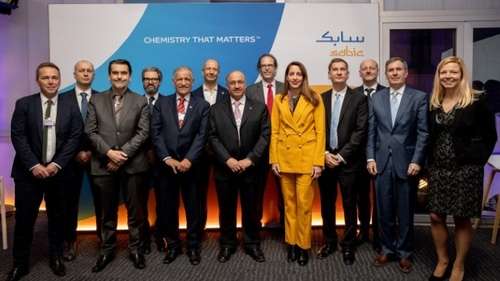
SABIC, a global chemical company, has introduced its TRUCIRCLE™ solutions at the World Economic Forum in Davos. The solutions include circular materials and technologies such as certified circular polymers, bio-based renewable polymers, and mechanical recycled polymers. SABIC is committed to achieving a more sustainable world and has worked with partners to advance a circular economy for plastic waste recycling. The company is also building a semi-commercial facility in the Netherlands to increase the production of pyrolysis oil from plastic waste. SABIC aims to increase the uptake of recycled plastic and collaborate in international initiatives to improve material circularity and sustainability.
Yousef Al-Benyan, SABIC Vice Chairman and CEO, said:
“SABIC is committed to achieving a more sustainable world and has an agenda in place to help customers achieve their sustainability goals. We have worked closely with partners across the value chain to advance a circular economy for the recycling of plastic waste and, in the last year, delivered TRUCIRCLE™ solutions to customers and brand-owners like Unilever and Tupperware Brands.”
He added, “SABIC is also moving forward with a semi-commercial facility that will increase the production of pyrolysis oil from plastic waste. We expect this facility, located at SABIC’s Geleen campus in The Netherlands, will be operational by 2021.”
The output from the facility will initially provide materials for SABIC’s downstream collaborators but the long term intention is to rapidly scale up the supply of its certified circular polymers for all global customers.
SABIC’s commitment to using more plastic waste as feedstock for its circular polymers runs parallel to its 2020 ambition to increase the uptake of recycled plastic from mechanical recycling. SABIC is determined to increase the amount of plastic it processes in Europe to 200Kt by 2025, in line with an EU Commission pledge.
SABIC also has been actively collaborating in international initiatives that can improve the circularity of material usage and unlock new sustainability opportunities.
In Saudi Arabia, SABIC is enabling the Kingdom to fulfil the waste management objectives of Saudi 2030 Vision including commitments to reduce landfill of waste and increase separate collection and recycling. Strategic alignments with Saudi Investment Recycling Company (SIRC), which is wholly owned by the Saudi Arabia Public investment Fund (PIF), are creating new opportunities in the waste management sector.
As part of its commitment to closing the loop, SABIC became a founding member of the World Plastics Council and the Alliance to End Plastic Waste and a partner of The Ocean Clean-Up. Each initiative aims to prevent plastic waste from reaching marine environments and ecosystems. The organisation also sees each of its TRUCIRCLE™ solutions as a firm contribution to its efforts to meet the UN Sustainable Development Goals.
In line with its strategic sustainability aspirations, SABIC works to recycle waste from its own manufacturing processes for use as secondary feedstock and started a holistic program to optimize the performance of its manufacturing facilities by improving the expertise, knowledge, and culture related to sustainability.
SABIC’s TRUCIRCLE™ solutions were showcased at the distinctive Innovation in the Circular Economy House (ICEhouse™), a concept-structure that presents new possibilities for building in closed-loop carbon systems that reduce energy and material waste.